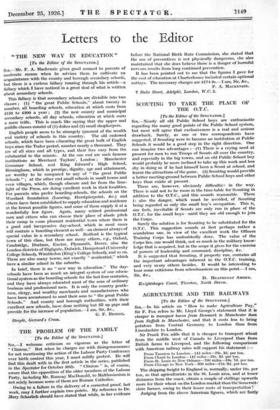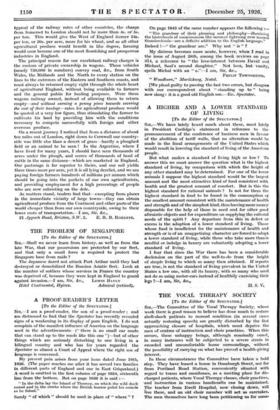AGRICULTURE AND THE RAILWAYS
[To the Editor of the SPECTATOR.] SIR,—In his article on " How to make Agriculture Pay," Sir F. Fox refers to Mr. Lloyd George's statement that it is cheaper to transport bacon from Denmark to Manchester than from Suffolk to Manchester, and that it costs less to bring potatoes from Central Germany to London than from Lincolnshire to London.
Sir Frank Fox adds that it is cheaper to transport wheat from the middle west of Canada to Liverpool than from British farms to Liverpool, and the following comparisons with American railway rates will support his statement :—
From Taunton to London-143 miles-28s. 3d. per ton. From Chard to London-142 mike-29s. 3d. per ton. From St. Louis to New Orleans-700 miles-16s. 7d. per ton. From Chicago to New York-900 miles-21s. 9d. per ton.
The shipping freight to England is, normally, under 10s. per ton, so that agriculturists in the St. Louis area, and at lesser
distances from the coast, obtain a couple of shillings upwards more for their wheat on the London market than the Somerset-- shire farmer, owing to their lesser costs of transportation Judging from the above 'American figures, which are fairly typical of the railway rates of other countries, the charge from Somerset to London should not bemore-than 4s. or 5s. per ton. This would give the West of England farmer 246. per ton, or 20s. per acre, more for his wheat, and as all other agricultural produce would benefit in like degree, farming would soon become one of the most flourishing and prosperous industries in England.
The principal reason for our exorbitant railway charges is the custom of private ownership in wagons. These vehicles (nearly 750,000 in numbers) convey coal, &e., from South Wales, the Midlands and the North to every station on the lines to the extremes of the Eastern and Southern coasts, and must always be returned empty right through the whole heart of agricultural England, without being available to farmers and the general public for loading purposes. Were these wagons railway owned, instead of allowing them to return empty—and without earning a penny piece towards covering the cost of their haulage—rates for agricultural produce would be quoted at a very low figure, thus stimulating the farmer to cultivate his land by providing him with the conditions necessary to compete successfully with foreign and other overseas produce.
On a recent journey I noticed that from a distance of about ten miles out of London, right down to Cornwall our country- side was little else than a desert of grass—hardly a ploughed field or an animal to be seen ! In the Argentine, where I have lived for many years, I should have seen thousands of acres under the plough, and scores of thousands of head of cattle in the same distance—which are marketed in England. Our pasturage is far superior to theirs, and our soil yields three times more per acre, yet it is all lying derelict, and we are paying foreign farmers hundreds of millions per annum which should be going into the pockets of our own agriculturists, and providing employment for a high percentage of people who are now subsisting on the dole.
As matters stand, traders find that—excepting from places in the immediate vicinity of large towns—they can obtain agricultural produce from the Continent and other parts of the world cheaper than from our own countryside, owing to their lower costs of transportation.—I am, Sir, &c.,
21 Appach Road, Brixton, S.W. 2. E. R. B. ROBERTS.



































 Previous page
Previous page